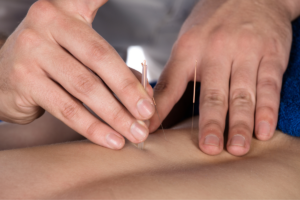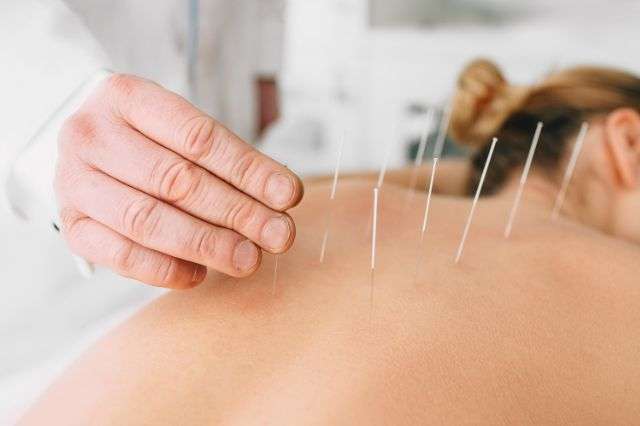Acupuncture therapy is a holistic treatment that addresses mental, physical, spiritual, and emotional health. It’s recognized by WHO (World Health Organization) and NIH (National Institute of Health) in the treatment of a number of conditions. Acupuncture is an ancient Chinese medicine that has been in use for thousands of years and is based on the meridian system. Meridians are pathways inside the body in which “qi” or life energy flows, according to traditional Chinese medicine. There are twelve meridians. The majority are named for the organ inside the body that they’re related to (for example, liver meridian, lung meridian, and heart meridian).
It’s the practice of using sterilized, very fine needles at pressure points to stimulate areas of the nervous system. These needles get inserted into certain spaces to move blood flow, unblock a blockage, as well as promote overall bodily balance. Sometimes, acupuncture is used in addiction treatment and holistic mental health treatment programs.
Some common conditions that acupuncture therapy has been utilized to treat are:
- Fibromyalgia
- Asthma
- Nausea
- Muscle aches
- Insomnia
- Osteoarthritis
- Infertility
- Dental pain
- Low back pain
- Labor pain
- Menstrual cramps
- Migraines and headaches
- Chronic pain
- Anxiety and depression symptoms
- Alcohol and drug withdrawal symptoms
Acupuncture: How it helps with addiction
Acupuncture studies are still in their infancy. Using it for addiction started in the 1970s in China when a doctor saw that acupuncture offered a decrease in withdrawal symptoms for those who abused opiates. Acupuncturists discovered that manipulating and inserting meridian points might potentially assist in reducing cortisol and balancing dopamine levels to lower cravings and withdrawal symptoms that come along with alcohol and drug detoxification.
AcuDetox is an acupuncture protocol created to alleviate the detox symptoms of drugs and alcohol. Created four decades ago by the NADA (National Acupuncture Detoxification Association), studies suggest AcuDetox is an efficient treatment for addiction as a relapse prevention tool, as well as a complement to approaches such as cognitive behavioral therapy. It is been demonstrated to:
- Boost energy
- Improve the quality of life
- Boost the opportunity of remaining sober after substance abuse disorder treatment
- Increase the opportunity of finishing addiction programs
- Ease withdrawal symptoms of alcohol and drugs
Usually, holistic addiction recovery facilities use AcuDetox during drug and alcohol detoxification and all throughout treatment. Acupuncture for substance abuse disorders works on a patient’s central nervous system to decrease the severity of common withdrawal symptoms of drugs and alcohol, including:
- Digestive problems
- Depression
- Anxiety
- Muscle cramps & aches
- Insomnia
- Cravings
Acupuncture for addiction evokes a better sense of well-being and calm. The fewer substance use withdrawal symptoms you experience, the better you will have the ability to concentrate on getting well. In addition, fewer symptoms of withdrawal might prevent relapse. Those who attempt to withdraw from alcohol and drugs by themselves without the assistance of professionals will probably relapse because they have the desire to stop the psychological or physical withdrawal symptoms that may come along with it.
Acupuncture for addiction: What is a session like?
AcuDetox will draw on auricular acupuncture protocol that is targeted to mental health disorders, trauma, and addictions. The actual acupuncture experience and session are a lot like a normal acupuncture session. The acupuncturist will insert sterile, very small needles into the skin, and then the patient sits quietly and still for about 20 to 30 minutes.
National Acupuncture Detoxification Association acupuncture targets 5 areas on a patient’s ear that are believed to be related to substance abuse. Such acupuncture is typically done in a group setting, and sessions run from 30 to 45 minutes. Participants claim to feel energized after the session but also relaxed and calm.
Acupuncture Therapy for Co-Occurring Disorders
Sometimes, mental health disorders co-occur with alcohol and drug addiction. People experiencing depression, anxiety, and additional types of mental health conditions might abuse alcohol and drugs to cope with mental health disorder symptoms. Efficient substance abuse disorder treatment should address alcohol and drug abuse, in addition to underlying problems such as mental health disorders.
Acupuncture may complement traditional mental disorder treatment. Some studies show acupuncture as an effective depression treatment when it is combined with therapy and antidepressants. It may help social-emotional health and increase a person’s quality of life. In addition, research suggests acupuncture may be an effective treatment for anxiety.
Dual diagnosis treatment that includes the use of acupuncture may help with the depression, anxiety, and stress often related to drug and alcohol addiction.
Receive Holistic Addiction Treatment at Pacific Bay Recovery

Pacific Bay Recovery center takes a holistic approach to drug and alcohol addiction treatment. We blend evidence-based therapies such as family, group, and individual therapy with alternative approaches in order for you to start repairing the spiritual, mental, and physical wounds of addiction. Our team has acupuncture experts experienced in the National Acupuncture Detoxification Association approach, and we provide various other types of alternative therapies. Our Pacific Bay Recovery facility offers alternative addiction therapies that include approaches like art therapy, EMDR, nutrition services, psychodrama, drum circle, and yoga.


